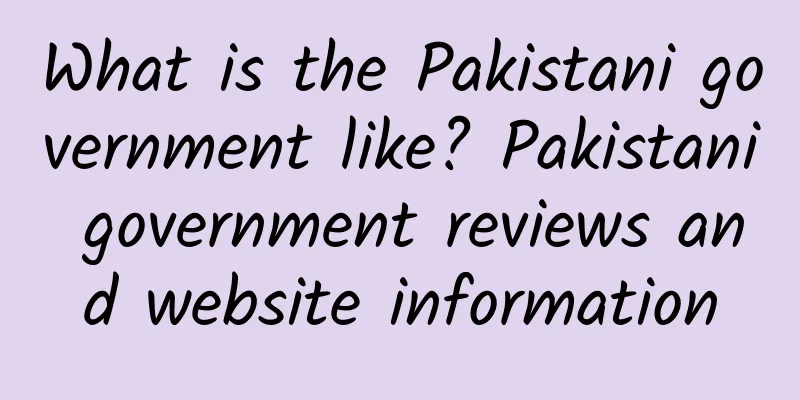What is the Pakistani government like? Pakistani government reviews and website information

|
What is the Pakistani government website? This website is the official website of the Pakistani government. It mainly provides information about Pakistan, government agencies, departmental functions, public services, news, etc. The website language is English. The Islamic Republic of Pakistan (abbreviated as Pakistan) is located in South Asia. Its capital and government seat are located in Islamabad. The official language is English. The head of state is the president and the head of government is the prime minister. Website: www.pakistan.gov.pk/gop/index.php?q=aHR0cDovLzE5Mi4xNjguNzAuMTM2L2dvcC8%3D The official website of the Government of Pakistan is the official portal of the Islamic Republic of Pakistan, which aims to provide global users with comprehensive information about Pakistan's national profile, government agency settings, departmental functions, public services and the latest news. The website is in English, which is convenient for international users to access and understand Pakistan's political, economic, cultural and social dynamics. Pakistan Country ProfilePakistan is located in the South Asian subcontinent, bordering India to the east, Iran to the west, Afghanistan to the north, and the Arabian Sea to the south. The capital and seat of government is Islamabad, a modern city that is also the political and administrative center of Pakistan. The official language of Pakistan is English, and although Urdu is the national language of the country, English is widely used in government, education, and business. The head of state of Pakistan is the president, while the head of government is the prime minister. The president is responsible for the symbolic duties of the state, while the prime minister holds the actual executive power. Pakistan's political system is a parliamentary democracy, with the government consisting of a cabinet led by the prime minister, whose members are responsible for the work of various government departments. Government agency settingsThe official website of the Pakistani government details the establishment and functions of government agencies. Pakistan's government agencies are divided into two levels: the central government and local governments. The central government is responsible for the overall policy formulation and implementation of the country, while the local government is responsible for the management of local affairs. The main agencies of the central government include:
Local government includes provincial governors, provincial councils and local government agencies, which are responsible for the management of local affairs. Department FunctionsThe various departments of the Pakistani government are responsible for different functions to ensure the normal operation of the country. Here is a brief introduction to the functions of some of the main departments:
Public ServicesThe Pakistani government's official website also provides a wealth of public service information, making it easier for citizens and businesses to obtain the government services they need. The following are some of the main public service contents:
News & AnnouncementsThe Pakistani government's official website also provides the latest news and announcements to ensure that the public can keep up to date with the latest government developments and policy changes. The news covers a variety of areas such as politics, economy, society, and culture, while the announcements include important government notifications and policy releases. By visiting the official website of the Pakistani government, users can obtain authoritative government information and public services, and learn about Pakistan’s national profile and government agency settings. This website is not only an important channel for Pakistani citizens to obtain government services, but also an important window for the international community to understand Pakistan. History and Culture of PakistanPakistan is a country with a long history and rich culture. Pakistan's history can be traced back to the Indus Valley Civilization in 2500 BC, one of the earliest civilizations in the world. Pakistan's culture is deeply influenced by Islam, Hinduism and Buddhism, forming a unique cultural tradition. Islam is the main religion in Pakistan, and about 95% of the population are Muslims. Islam has had a profound impact on Pakistan's society, culture and politics. Most of Pakistan's festivals and celebrations are related to Islam, such as Eid al-Fitr and Eid al-Adha. Pakistan's culture is also reflected in its rich artistic and literary traditions. Pakistan's music, dance, painting and handicrafts are unique. Pakistan's literary works are mainly in Urdu and English, and many famous poets and writers have emerged. Pakistan's Economy and DevelopmentPakistan is a developing country with an economy mainly based on agriculture, and its industry and service industries are also developing. Pakistan's main crops include wheat, rice, cotton and sugarcane, and agriculture is an important pillar of the national economy. In recent years, Pakistan's industry and service industries have developed rapidly, and information technology, textiles and manufacturing have become important drivers of economic growth. The Pakistani government is committed to promoting economic development, improving infrastructure, attracting foreign investment, and promoting trade and investment. Pakistan's economic policy aims to achieve sustainable development and inclusive growth, reduce poverty, and improve people's living standards. Pakistan's International RelationsPakistan plays an important role on the international stage and is a member of international organizations such as the United Nations, the Organization of Islamic Cooperation, and the South Asian Association for Regional Cooperation. Pakistan maintains extensive cooperative relations with countries and regions such as China, the United States, Russia, and the European Union. Pakistan and China have a long history of friendly relations, and the two countries have continuously deepened their cooperation in the fields of politics, economy, military, culture, etc. The China-Pakistan Economic Corridor is an important project of cooperation between the two countries, which aims to promote regional economic development through infrastructure construction. The relationship between Pakistan and the United States is complex and ever-changing, with both cooperation and disagreements. The relationship between Pakistan and India has long been tense, and the dispute between the two countries over Kashmir is one of the main hot issues in South Asia. Society and People's Livelihood in PakistanPakistan has a complex social structure, a large population, and diverse ethnic groups and languages. The main ethnic groups in Pakistan include Punjabis, Sindhis, Pashtuns, and Balochs, each with its own unique culture and traditions. The livelihood issues in Pakistan mainly include education, health, employment and housing. The Pakistani government is committed to improving people's livelihood, raising the level of education, improving medical services, promoting employment and providing housing security. Pakistan's education system includes basic education, secondary education and higher education. The Pakistani government implements a compulsory education policy and strives to improve the literacy rate and education level of its citizens. Pakistan's medical and health system is also constantly improving, and the government is committed to providing basic medical services and improving public health conditions. Pakistan's Environment and ResourcesPakistan has rich natural resources, including minerals, water resources and agricultural resources. Pakistan's mineral resources mainly include coal, natural gas, oil, copper, gold and iron ore. Pakistan's water resources mainly come from the Indus River and its tributaries. Agricultural irrigation and hydropower generation are the main ways to use water resources. Pakistan's environmental problems are becoming increasingly prominent, mainly including water shortage, land degradation, air pollution and biodiversity reduction. The Pakistani government is committed to environmental protection, promoting sustainable development policies, strengthening environmental governance and protecting natural resources. Technology and Innovation in PakistanPakistan's science and technology development has made remarkable progress in recent years, with important breakthroughs in information technology, biotechnology, energy technology and space technology. Pakistan's science and technology policy aims to promote scientific and technological innovation, promote the transformation of scientific and technological achievements, and enhance the country's scientific and technological competitiveness. Pakistan's technological innovation is mainly reflected in the field of information technology. Pakistan's software and information technology service industry has developed rapidly, and a number of internationally competitive technology companies have emerged. Pakistan's scientific research institutions and universities are also actively carrying out scientific research activities to promote technological innovation. Tourism and Cultural Heritage in PakistanPakistan has rich tourism resources and cultural heritage, attracting tourists from all over the world. Famous tourist attractions in Pakistan include the Karakoram Mountains, the Himalayas, the ruins of the Indus Valley Civilization, the architecture of the Mughal Empire and Islamic holy sites. Pakistan has great potential for tourism development, and the government is committed to promoting the development of tourism, improving tourism infrastructure, enhancing the quality of tourism services, and attracting more international tourists. Pakistan has a rich and diverse cultural heritage, including historical buildings, archaeological sites, traditional handicrafts and folk art. Pakistan's future prospectsPakistan's future development is full of hope and challenges. The Pakistani government is committed to promoting economic reform, improving people's livelihood, promoting social harmony, maintaining national security, and enhancing its international status. Pakistan's future development requires balance and coordination in multiple fields such as economy, society, environment, science and technology, and culture. Pakistan's future development still needs the support and cooperation of the international community. Pakistan will continue to strengthen friendly relations with various countries, promote regional cooperation and promote common development. Pakistan's future development will make important contributions to peace and prosperity in South Asia and the world. By visiting the official website of the Pakistani government, users can fully understand Pakistan's national profile, government agency settings, departmental functions, public services and the latest news. This website is not only an important channel for Pakistani citizens to obtain government services, but also an important window for the international community to understand Pakistan. |
<<: How is Thai Airways International? Thai Airways International Reviews and Website Information
>>: How is Niang TYPE? Niang TYPE review and website information
Recommend
How is Ochanomizu University in Japan? Reviews and website information of Ochanomizu University in Japan
What is the website of Ochanomizu University in Ja...
How is US News? US News and World Report (US News) reviews and website information
What is US News? US News publishes the latest news...
The efficacy and function of old brown rice wine
Old brown rice wine is a traditional Chinese liqu...
How to make pork loin porridge
Today I will introduce a delicious food, pork loi...
What are the uses of ylang-ylang essential oil?
Ylang ylang essential oil is a plant essential oi...
What are the effects of chicken blood vine bracelets? What are the effects and functions of chicken blood vine bracelets?
As we all know, Millettia reticulata is a traditi...
How to plant eggplant? Eggplant planting technology
How to plant eggplant? Today I will introduce the...
How is Japan Fuji Women's University? Japan Fuji Women's University reviews and website information
What is the website of Fuji Women's University...
Steps to cook yellow croaker with soft tofu
Below I will introduce to you the method of cooki...
How is the Vanuatu Tourism Bureau? Vanuatu Tourism Bureau reviews and website information
What is the website of Vanuatu Tourism Bureau? Van...
What is the British Library like? British Library reviews and website information
What is the British Library website? The British L...
How to make your own loofah water - step by step guide
Sponge gourd is a common dish in summer. It is sa...
The efficacy and method of drinking bitter melon soaked in water
Everyone must be familiar with bitter melon . Bit...
Nutritional value of raw fish Benefits of eating raw fish
Raw fish is a common edible fish in life. It is a...
How is the Bank of Korea? Reviews and website information of the Bank of Korea
What is the Bank of Korea website? The Bank of Kor...









